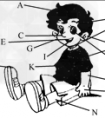根据句子的意思以及括号内的提示完成句子。1. Don't wake him up.He has just fallen __________.2. Where does the talk ________ (大概) take place?3. Such an ad-八年级英语
c)1et sb.do sth.让某人做某事 had better do sth.最好做某事
30. fall to the ground 倒在地上
31.go over 走过去,复习功课
32. hurry to school 勿忙去上学
33.be late for the first class 第一节课迟到
34.say with a smile 微笑地说
35.be glad to do sth.高兴做某事
36.do a good thing (deed) 做一件好事
37.fall ill=be i11 生病,患病
38.take sb. to a hospital 把某人送到医院
39.rain heavily 下大雨
40.on the road 在公路上
41.not know what to do 不知道该做什么
42.just then 正在那时
43.come up 走进,上来
44.in front of 在……前面
45.thank sb. again and again 反复感谢某人
46.drive away (汽车)离开
run away 跑开
take away 拿走
47.right away 立刻
48.right now 此刻,刚才,现在
49.get home 到家 get there 到达哪儿 get here 到达这儿
50. yesterday morning 昨天晚上
51.leave the hospital 离开医院
52.no buses=not any buses 没有车
53.say to sb.对某人说 say to oneself 自言自语
54.fall off 跌落
55.need to get up early 需要早起床
56.hurt my arm 胳膊受伤
57.What's wrong with you?=What's the matter with you? 你怎么了?
58.do one's homework on the computer 在电脑上做作业
59.have four English lessons 上四节英语课
60.once a week 一周一次 twice a year 一年两次 three times a month 一个月三次
61.do more listening and speaking 做大量的听说练习
do some cleaning 扫除
do some washing 洗衣服
do some shopping 购物
62.make good progress in English 在英语方面取得很大进步
63.help a lot in our studies 在学习上给子很大帮助
64.teach sb. English 教某人英语
65.get to school 到达学校
66.give sb.lessons 给某人上课
67.ask sb.to do sth.要求某人做某事
ask sb.not to do sth.要求某人不要做某事
68.let sb. do sth.让某人做某事
1et sb. not do sth.让某人不要做某事
69.not……until 直到……才
70.make one's lessons interesting 使某人的课上的很有趣
71.tell sb. how to do sth.告诉某人怎样做某事
72.try to learn new things be oneself 设法靠自己学一些新的知识
73.want to be a history teacher 想成为一名历史老师
74.grow up 长大
75.in future 在将来
76.computer room (电脑)机房
77.language lab 语言室
78.finish middle school 中学毕业
79.want to become (be) a designer 想成为一名设计家
80.wish to be doctor 希望成为一名医生
81.an American boy 一个美国男孩儿
82.study in a high school 在高中学习
83.in Grade Eight 在八年级
84.finish primary school 小学毕业
85.start school at the age of seven
=begin to school when I was seven 七岁开始上学
86.move to Washington with his family 和他全家搬到华盛顿
87.be interested in 对……感兴趣
88.want to become a doctor of Chinese medicine 想成为一名中医
89.come here to learn Chinese 来这儿学习中文
90.a nice school 一所好的学校
91.instead of 代替
92.in many ways 在许多方面
93.be different from 与……不同
94.by the way 顺便说
95.come back home 回家
96.be sorry for 为…难过,遗憾
97.feel sorry for 为…难过,遗憾
98.burn away 燃烧没了
99.open the door 开门
100.take sb. in one's arms 拥抱某人
101.have some medicine 吃药
102.have a football match 进行一场足球比赛
103.have a meeting 开会
104.walk back 向后走
105.give sth. back to sb. 把某物还给某人
106. work through the night 通宵工作
107.get through the examinations=pass the exam 通过考试
108.happen to 发生
l09.knock at the door 敲门
110.want to do sth. 想做…
111.fall down 掉下来
112.begin to do sth. 开始做…
113.have some tea 喝茶
114.have sports 进行体育锻炼
115.have a bad coId 得了重感冒
116.have a good time 玩的很高兴
117.keep back 向后退
118.so…that 如此…以至于…
考点名称:副词
- 副词:
是一种用来修饰动词、形容词、全句的词,说明时间、地点、程度、方式等概念的词。副词是一种半虚半实的词。
副词可分为:地点副词、方式副词、程度副词、疑问副词和连接副词。
副词连用顺序:程度副词+方式副词+地点副词+时间副词。 副词分类:
1、时间副词有三类:always, often, usually, sometimes, never, ever, hardly等一般位于系动词、情态动词和助动词之后,实之前义动词
1)表示发生时间的副词:
It’s beginning to rain now! 现在开始下雨了!
2)表示频繁程度的副词,也称频度副词always, often, usually, sometimes, never, ever, hardly等一般位于系动词、情态动词和助动词之后,实之前义动词:
She often changes her mind. 她常改变主意。
3)还有一些其他表示时间的副词:
He has just had an operation. 他刚动过手术。
2、地点副词:
1)有不少表示地点的副词:
She is studying abroad. 她在国外留学。
2)还有一些部分与介词同形的副词。它们与介词同形,跟宾语的是介词,否则是副词:
①用作介词:Stand up! 起立!
②用作副词:A cat climbed up the tree. 猫爬上了树。
3)以where 构成的副词也是地点副词:
It’s the same everywhere. 到处都一样。
3、方式副词:
carefully, properly(适当地), anxiously(焦虑地), suddenly, normally(正常地), fast, well, calmly(冷静地), politely(有礼貌地), proudly(自豪地), softly, warmly ,slowly
4、程度副词:
much,little, very,rather(相当),so,too,still, quite, perfectly(完美地), enough, extremely(非常), entirely(整个),almost, slightly(细小地), hardly.
5、疑问副词:
how, when, where, why.
6、关系副词:
when, where, why.等。
7、 连接副词:
therefore(因此),moreover(此外),however,otherwise(另外的),then,when ,where,how,why等。副词的语法作用:
副词在句中可作状语,表语,补语,定语。
He works hard. (作状语)
他工作努力。
You speak English very well. (作状语)
你英语讲的相当好。
Is she in ? (作表语)
她在家吗?
Let's be out. (作表语)
让我们出去吧。
Food here is hardly to get. (here作定语,hardly作状语)
这儿很难弄到食物。
Let him out!(作补语)
让他出去!
修饰名词的副词放在被修饰词之后
a. The villagers there are busy getting in wheat.不同类型副词的用法比较:
方式副词:
1)英语中有大量方式副词,说明行为方式(回答how的问题):
How beautifully your wife dances. 你夫人舞跳的真美。
2)还有相当多的副词,表示某些情绪:
She smiled gratefully. 她感激的笑了笑。
3)还有一些以-ly结尾的副词,表示动作发生的状况:
He left the town secretly. 他悄然离开了这座城市。
程度副词和强调副词 :
1)程度副词可修饰动词,表示“到某种程度”: Is she badly hurt? 她伤得重吗?
[说明] 这类副词除修饰动词外,还可修饰形容词(a)或另一副词(b):
a. fairly simple 相当简单 quite correct 完全正确
b. wonderfully well 好极了 do it very quickly 干得很快
2)much 是一个特殊的程度副词,它可以:
a. 修饰形容词等:
I’m not much good at singing. 我唱歌不太好。
b. 修饰比较级:
You sing much better than me. 你比我唱的好多了。
Their house is much nicer than ours. 他们的房子比我们的好多了。
疑问副词和连接副词:
1)疑问副词:疑问副词用来引导特殊问句:
how: How is your grandmother? 你奶奶身体好吗?
where: Where does she come from? 她是哪儿人?
when: When can you come? 你什么时候能来?
why: Why was he so late? 他为什么来得这么晚?
2)连接副词:连接副词意思和词形都和疑问副词一样,但都引导从句或与不定式连用:
how: Do you know how to start this machine? 你知道这台机器怎样启动吗?
where: I don’t know where he lives. 我不知道他住在哪儿。(引导宾语从句)
when: Tell me when you’ll be ready. 告诉我你什么时候准备好。(引导宾语从句)
why: That’s why I came round. 这就是我来的原因。(引导表语从句)
一些其它类型的副词,如表示方向的副词:
Let’s go inside. 咱们到里面去。
Take two steps forward. 向前走两步。- 副词的位置:
1、实义动词前,be动词、情态动词之后。
- 最新内容
- 相关内容
- 网友推荐
- 图文推荐
| [家长教育] 孩子为什么会和父母感情疏离? (2019-07-14) |
| [教师分享] 给远方姐姐的一封信 (2018-11-07) |
| [教师分享] 伸缩门 (2018-11-07) |
| [教师分享] 回家乡 (2018-11-07) |
| [教师分享] 是风味也是人间 (2018-11-07) |
| [教师分享] 一句格言的启示 (2018-11-07) |
| [教师分享] 无规矩不成方圆 (2018-11-07) |
| [教师分享] 第十届全国教育名家论坛有感(二) (2018-11-07) |
| [教师分享] 贪玩的小狗 (2018-11-07) |
| [教师分享] 未命名文章 (2018-11-07) |






